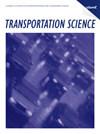基于热图的拼车系统重新定位决策支持
IF 4.8
2区 工程技术
Q1 OPERATIONS RESEARCH & MANAGEMENT SCIENCE
引用次数: 0
摘要
在拼车系统中,平台提供商旨在将司机分布在城市中,以满足当前和潜在的未来需求,并避免服务取消。在众包车队的情况下,确保这种分配尤其具有挑战性,因为驾驶员不是集中控制的,但可以自由决定在空闲时重新定位。因此,供应商寻找其他方式来确保车辆分配对用户、驾驶员和供应商有利。我们提出了一种直观的方法来改善闲置拼车的重新定位:重新定位热图。这些热图突出了基于预期未来需求、当前和预期未来车队分布以及特定驾驶员位置的驾驶员特定收入机会。根据热图,驾驶员可以做出分散但更明智的重新定位决策。随着我们的热图政策在未来改变驾驶员分布,我们提出了一种自适应学习算法,用于在大规模拼车系统中设计热图。我们模拟系统,并在每次迭代中基于先前学习的策略生成热图。然后,我们根据模拟结果更新策略,并在下一次迭代中使用它。我们在纽约拼车数据的综合案例研究中测试了我们的热图设计。我们表明,精心设计的热图大大减少了服务取消,从而大大减少了平台和司机的收入损失,同时为用户带来了更好的服务水平,并为司机带来了更公平的待遇。历史:本文已被交通科学特刊《机器学习方法及其在大规模路线规划问题中的应用》接受。资助:这项研究由德国研究基金会(Deutsche Forschungsgemeinschaft)资助[拨款494812908]。M.W.Ulmer的工作得到了德国研究基金会艾美奖Noether项目的资助[444657906]。补充材料:在线附录可在https://doi.org/10.1287/trsc.2023.1202。本文章由计算机程序翻译,如有差异,请以英文原文为准。
Heatmap-Based Decision Support for Repositioning in Ride-Sharing Systems
In ride-sharing systems, platform providers aim to distribute the drivers in the city to meet current and potential future demand and to avoid service cancellations. Ensuring such distribution is particularly challenging in the case of a crowdsourced fleet, as drivers are not centrally controlled but are free to decide where to reposition when idle. Thus, providers look for alternative ways to ensure a vehicle distribution that benefits users, drivers, and the provider. We propose an intuitive mean to improve idle ride-sharing vehicles’ repositioning: repositioning heatmaps. These heatmaps highlight driver-specific earning opportunities approximated based on the expected future demand, current and expected future fleet distribution, and the location of the specific driver. Based on the heatmaps, drivers make decentralized yet better-informed repositioning decisions. As our heatmap policy changes the driver distribution in the future, we propose an adaptive learning algorithm for designing our heatmaps in large-scale ride-sharing systems. We simulate the system and generate heatmaps based on the previously learned policy in every iteration. We then update the policy based on the simulation’s outcome and use it in the next iteration. We test our heatmap design in a comprehensive case study on New York ride-sharing data. We show that carefully designed heatmaps reduce service cancellations and therefore, revenue loss for the platform and drivers significantly while leading to a better service level for the users and to a fairer treatment of drivers. History: This paper has been accepted for the Transportation Science Special Issue on Machine Learning Methods and Applications in Large-Scale Route Planning Problems. Funding: This research is funded by the German Research Foundation (Deutsche Forschungsgemeinschaft) [Grant 494812908]. M. W. Ulmer’s work is funded by the German Research Foundation Emmy Noether Programme [Grant 444657906]. Supplemental Material: The online appendix is available at https://doi.org/10.1287/trsc.2023.1202 .
求助全文
通过发布文献求助,成功后即可免费获取论文全文。
去求助
来源期刊

Transportation Science
工程技术-运筹学与管理科学
CiteScore
8.30
自引率
10.90%
发文量
111
审稿时长
12 months
期刊介绍:
Transportation Science, published quarterly by INFORMS, is the flagship journal of the Transportation Science and Logistics Society of INFORMS. As the foremost scientific journal in the cross-disciplinary operational research field of transportation analysis, Transportation Science publishes high-quality original contributions and surveys on phenomena associated with all modes of transportation, present and prospective, including mainly all levels of planning, design, economic, operational, and social aspects. Transportation Science focuses primarily on fundamental theories, coupled with observational and experimental studies of transportation and logistics phenomena and processes, mathematical models, advanced methodologies and novel applications in transportation and logistics systems analysis, planning and design. The journal covers a broad range of topics that include vehicular and human traffic flow theories, models and their application to traffic operations and management, strategic, tactical, and operational planning of transportation and logistics systems; performance analysis methods and system design and optimization; theories and analysis methods for network and spatial activity interaction, equilibrium and dynamics; economics of transportation system supply and evaluation; methodologies for analysis of transportation user behavior and the demand for transportation and logistics services.
Transportation Science is international in scope, with editors from nations around the globe. The editorial board reflects the diverse interdisciplinary interests of the transportation science and logistics community, with members that hold primary affiliations in engineering (civil, industrial, and aeronautical), physics, economics, applied mathematics, and business.
 求助内容:
求助内容: 应助结果提醒方式:
应助结果提醒方式:


